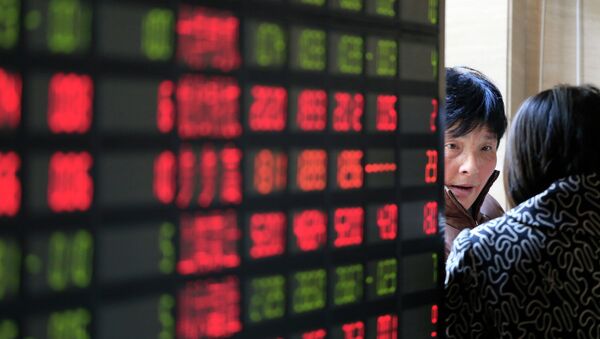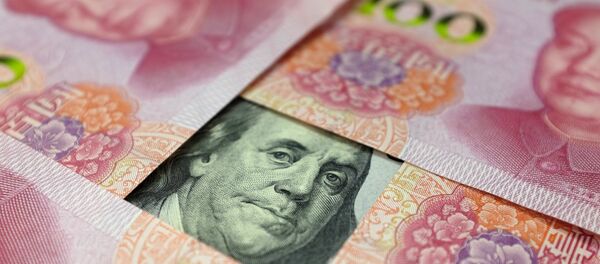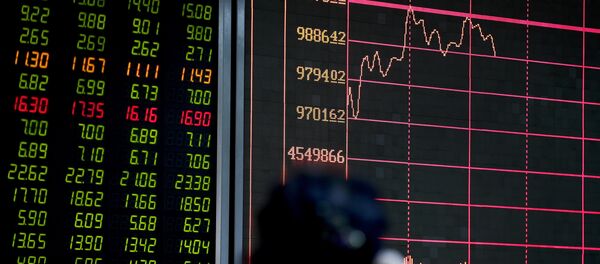Kristian Rouz — International financial and commodity markets have posted significant declines over the past two months, with mainland China's unsatisfactory economic performance being one of the main factors feeding the global anxiety. Meanwhile, as Beijing insists the Communist nation's macroeconomic fundamentals are sustainable, with trade data showing relatively encouraging performance, international traders and investors have become increasingly concerned by alleged data rigging undertaken by the Chinese authorities. During the past year, Beijing has admitted to several episodes of data manipulation, stirring an uproar of international mistrust. Frighteningly, the full scale of the data-rigging is almost impossible to calculate.
Tuesday's remarks from mainland China's National Bureau of Statistics (NBS), underlining the stability of the nation's macroeconomic fundamentals met a cold reaction from the markets. Even though Wang Baoan of NBS reiterated the GDP data is trustworthy and the overall economy is resistant to emerging challenges (China's economy added 6.8% in Q4, and 6.9% for the entire year of 2015), the statement stirred a heated discussion of whether the numbers claimed by Beijing are realistic.
One particular aspect of the debate is about the long-term mismatch in China's trading data, with volumes of bilateral exchange in goods and services between the mainland and Hong Kong reported in different numbers by each side in December. The mismatch might indicate the mainland might be rigging its trade data with other counterparts too.
The mainland reported $46 bln of exports to Hong Kong in December, according to Customs General Administration in Beijing. Meanwhile, on the Hong Kong side, the amount of imports from China were reported at $23.7 bln for the same period, according to the Hong Kong Government Information Centre. The resulting discrepancy of $22.3 bln is, firstly, the highest since March 2013 and, secondly, indicates the trading data has been continuously mismanaged over an extended period of time.
Mainland China's possible exaggeration of its trade performance, allegedly aimed at creating the illusion of a solid trade surplus, allows the nation to affect capital movements and the renminbi on-shore and off-shore exchange rates, capitalizing on the improved sentiment of investors and traders and their stronger confidence of the Chinese economy.
Meanwhile, mainland China's shares dropped 6.4% on Tuesday, extending losses to 22% this month only, settling at a 14-month low. Market participants are expecting higher capital outflows and a depreciation of the renminbi over the concerns of the nation's overall growth, and these potential developments are exactly what the government might be attempting to prevent due to the already rife disinvestment.
Another set of data in focus is the unexpectedly robust rise in Chinese imports of industrial metals recorded in December. The mainland's huge manufacturing sector is the world's biggest consumer of metals, and while the overall growth slowed and industrial production staggered in December due to near-disinflation at the factory gate, the rise in imports of copper and zinc to multi-year highs does not look like economic normality.
Mainland China imports of refined copper rose to their highest since 2008, to 423,181 tons, or 34% annual growth, and zinc imports topped their 2009 high at 94,434 tons in December, with metals prices at their multi-year lows on the London Metal Exchange as well.
The massive purchases, however, hardly affected metals prices, with copper adding just 0.4%.
As mainland China's trading data debate lingers, the Beijing-claimed ‘sound performance' of the nation's economy does little to resolve the persistent glut of oversupply in the oil market. On a brighter note, however, the fact that Beijing has undertaken some sensible effort to reform the nation's economy in order to bring it back on track, while the 14-month lows in China's bourses suggest the stock bubble has by now nearly deflated to its 2014 'normal', narrowly avoiding a disastrous burst. That said, Beijing might still be able to return its economy to sustainable growth, however, at this point the mainland is losing the market's confidence.



